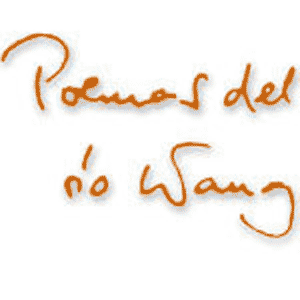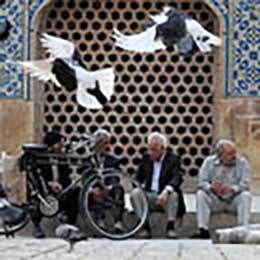 |
zè jìng yīn gōng huái yōu yīn duō lǜ tái yīng mén dàn yíng sǎo wèi yǒu shān sēng lái mountain path under the shadow of sophora trees hidden and humid and covered with green moss yet to be swept in front of the gate a guest may come the old man of the mountains will perhaps come today |
“It was on Language Hat’s blog that I read for the first time about the “Poems of Wang River” – 辋川诗抄 – blog, written by Studiolum and his friends, and the more I read it, the more I grew fond of it. Finally I decided to start to translate it just out of pleasure, and to gradually build from my translations a Chinese version of the blog behind the Great Fire Wall. And I also began to think about why I love this blog so much to take time to translate it and to want to show it to everyone. In this modest introduction to the translation I want therefore to tell you about my reasons to do so.
Probably one reason is that this blog is able to witness again and again about the love of life and beauty. There is not much to speak about this, it is enough to observe the sharp look behind the choice of each picture and to read the fascinating and moving stories, and you will feel the same way I do. Another thing that touched me is the erudite cosmopolitanism.
The Poems of Wang River is not just a cosmopolitan blog, but, to exaggerate a little bit, the Poems of Wang River is cosmopolitanism itself. Wandering all over the world, all the same whether afoot or on mouseback, to discover, to understand, to dissolve the boundaries between “them” and “us”, to seek for the common sources of the distant places and of ourselves – this impulse is a captivating feature of River Wang. And I find particularly rare the sensitivity and complexity with which the Poems of River Wang deals with history, in the manner of a really free person: by forgiving, but not forgetting. Just take a peek into any entry and you will immediately see how Studiolum and his friends never deny the beauty of history in view of the ugliness of history, neither use they the beauty of history to dissimulate the ugliness of history. They examine the injustices of the past not with hatred, but neither make they concession of the basic principles of humanity for the sake of any hypocritical avoidance of conflicts. And if you are, like me, a person who is seeking for a path in the obscurity of mutually conflicting ideas and interpretations of history, then Wang River allows you to find a direction in the flow and eddies of thoughts and to follow it.
Chinese internet, just like the internet in any other language of the world, is still filled with deliberate ignorance and not-necessarily-malevolent prejudices towards the world – no matter whether in the land of “theirs” or “ours”. But a sincere quest to understand the real world through the virtual one has already brought some gain in comparison with the nothing of ten years ago. With this consolation in mind I dedicate myself to translate the poems of Wang River, thereby contributing to my ability to this initial stage of the evolution, and also because I am convinced that information, especially when presented with love and beauty, is always more than just information. In every corner of the unknown land, in each period of the remote history there was always someone whose face was brightened by a warm smile. If the reader by the end of this translation will experience this smile, the warm of the hearth, it is the supreme crown of the translator’s efforts.”
Probably one reason is that this blog is able to witness again and again about the love of life and beauty. There is not much to speak about this, it is enough to observe the sharp look behind the choice of each picture and to read the fascinating and moving stories, and you will feel the same way I do. Another thing that touched me is the erudite cosmopolitanism.
The Poems of Wang River is not just a cosmopolitan blog, but, to exaggerate a little bit, the Poems of Wang River is cosmopolitanism itself. Wandering all over the world, all the same whether afoot or on mouseback, to discover, to understand, to dissolve the boundaries between “them” and “us”, to seek for the common sources of the distant places and of ourselves – this impulse is a captivating feature of River Wang. And I find particularly rare the sensitivity and complexity with which the Poems of River Wang deals with history, in the manner of a really free person: by forgiving, but not forgetting. Just take a peek into any entry and you will immediately see how Studiolum and his friends never deny the beauty of history in view of the ugliness of history, neither use they the beauty of history to dissimulate the ugliness of history. They examine the injustices of the past not with hatred, but neither make they concession of the basic principles of humanity for the sake of any hypocritical avoidance of conflicts. And if you are, like me, a person who is seeking for a path in the obscurity of mutually conflicting ideas and interpretations of history, then Wang River allows you to find a direction in the flow and eddies of thoughts and to follow it.
Chinese internet, just like the internet in any other language of the world, is still filled with deliberate ignorance and not-necessarily-malevolent prejudices towards the world – no matter whether in the land of “theirs” or “ours”. But a sincere quest to understand the real world through the virtual one has already brought some gain in comparison with the nothing of ten years ago. With this consolation in mind I dedicate myself to translate the poems of Wang River, thereby contributing to my ability to this initial stage of the evolution, and also because I am convinced that information, especially when presented with love and beauty, is always more than just information. In every corner of the unknown land, in each period of the remote history there was always someone whose face was brightened by a warm smile. If the reader by the end of this translation will experience this smile, the warm of the hearth, it is the supreme crown of the translator’s efforts.”

Beyond our deep gratitude and emotion, it is particularly amazing in this introduction that it highlights exactly what we consider as most important in the Poemas del Río Wang, more important than its strong visuality, its many languages, its focus on inaccessible places or anything else that for a European or American eye would be conspicuous for the first sight on the blog.
Our second thought is how great a responsibility is the launching of such a new version. We have already experienced that every new language means a new audience, new criteria and new expectations, so that when writing about the recent past of Mallorca or Hungary, we also have to take into account how it will be understood in Moscow or in Baku. But to write so that we know, it will be interpreted by almost one and half billion potential readers on the other side of the globe, in a completely different culture, is no laughing matter. We will have to try to live up to the task.
We wish the road to be a long one. Full of adventure, full of discovery.



























































































































































Add comment